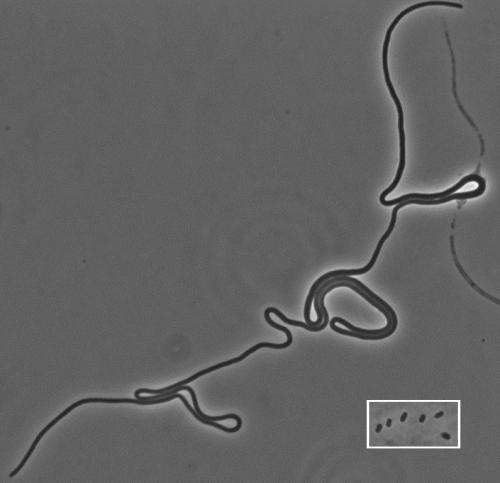Mutant bacteria that keep on growing

The typical Escherichia coli, the laboratory rat of microbiology, is a tiny 1-2 thousandths of a millimeter long. Now, by blocking cell division, two researchers at Concordia University in Montreal have grown E. coli that stretch three quarters of a millimeter. That's up to 750 times their normal length. The research has potential applications in nanoscale industry, and may lead to a better understanding of how pathogens work. The study is published ahead of print on February 17 in the Journal of Bacteriology.
Normally, an E. coli grows until its length doubles, and then it divides. Many previous studies had shown that if cell division were blocked, the bacterium would grow still longer. However, such cells would presumably die within a few hours, said first author Ziad El-Hajj, a post-doctoral fellow, because the mutations that blocked cell division also interfered with some other aspect of physiology that was necessary for a cell's survival. "Our hypothesis was if the block in cell division were so specific that it would not affect any of the cell's other processes, the cells would simply keep elongating," he said.
Once they isolated a viable mutant where, presumably, physiological processes besides cell division were unaffected, that's what happened. El-Hajj noted that even the longest mutant cells had no subdivisions and all the normal cellular material was spread along the microbe's entire length. Remarkably, he said, when they allowed the cells to resume cell division, prior to dividing anew, the cells formed loops at multiple points along their length, and then divided at or near these loops.
The investigators have not yet figured out why this mutant is unable to divide. "We know that they have reduced levels of a protein called FtsZ, which is almost ubiquitous in bacteria and is essential for their division," said El-Hajj. "Why it is reduced remains uncertain."
New industrial tubes, that straddle the interface of biology, materials science, and nanotechnology could be made from the cell walls of the hyper-elongated E. coli, said El-Hajj, noting that such technology was already being developed on a much shorter scale. Franziska Lederer of the Helmholtz-Zentrum Dresden-Rossendorf, Germany has already demonstrated the use of "filamentous" E. coli cell structures, which range up to 50-70 micrometers, to create conductive metallic wires, which he writes could be used in electronic devices, or as novel catalysts.
El-Hajj also suggests that such tubes might be used as gene therapy delivery devices. Additionally, he speculates that creating such lengthy bacteria might be useful for achieving a greater understanding of pathogenic species. The advantage: using tiny needles—perhaps made from elongated E. coli—one could extract enough cytoplasm to study it in isolation from membrane materials, in order to illuminate their biochemistry. Currently, there is no way to separate cytoplasm from membrane that offers certainty of purity.
"Ironically, the research originally focused on a different topic, an E. coli strain that failed to make a compound that is essential to all types of cells," said El-Hajj. The strain unexpectedly lacked another compound, the amino acid methionine, and so in order to understand why, El-Hajj and coauthor Elaine B. Newman, Distinguished Professor Emeritus, Biology, created many mutants that did not require methionine, said El-Hajj. "One shocked us when we saw that it made extremely long cells, and we decided to focus on the biology of long E. coli."
Journal information: Journal of Bacteriology
Provided by American Society for Microbiology

















